Harman adopts Android connectivity protocol for infotainment systems
Jul 12, 2011 — by Eric Brown — from the LinuxDevices Archive — 19 viewsHarman International Industries announced that its automotive infotainment systems now support the Android Open Accessory Protocol found in Android 3.1 (and available as an upgrade in Android 2.3.4). The USB-based protocol enables users to control Android smartphone or tablet content, including multimedia and navigation apps, through a car's dashboard or steering-wheel controls, says the company.
According to Harman, it's the first major technology partner in the automotive industry to support the Android Open Accessory Protocol. Available now for automotive installations, the connectivity standard is now supported across all Harman infotainment platforms, including entry-level, mid-priced, and luxury automobile systems. It builds on previous support for Android email and SMS integration, the company adds.

A Harman automotive infotainment system
The protocol is built into devices running Android 3.1 ("Honeycomb"), and is a software upgrade for devices running the latest Android 2.3.4 version of "Gingerbread" (see farther below for more background). In the case of the Harman systems, the protocol allows Android devices to connect to the dashboard or rear-seat installations via USB.
With the Android Open Accessory Protocol, drivers can activate music apps, such as Harman's Aha Radio service, through voice activation or steering wheel controls, says Harman. In addition, apps that provide information on nearby restaurants, tourist spots, or gas stations can be overlaid onto existing map software, says the company. Android integration is also said to enable content to be streamed to rear-seat entertainment devices.
Android Open Accessory Protocol background
In conjunction with the roll-out of Android 3.1 in May, Google published an Android Accessory gadget control platform API and application development kit (ADK). The ADK, which is being backported to the new Android 2.3.4 for smartphones, enables any USB-connected accessory designed with the API to interact with Android devices.
As detailed on Google's Android Open Accessory site, the ADK builds upon the newly enhanced USB skills of Android 3.1 and Android 2.3.4 to help developers create Android hardware peripherals that connect to Android devices via USB, enabling the peripherals to act as a USB host.
Initially, at least all the external devices must use a device compatible with the popular Arduino microcontroller platform, a component not mentioned in the Harman announcement.
Third parties have announced support for the protocol, including FTDI and Microchip (see farther below). As Harman noted, however, it appears to be the first automotive supporter. A reference hardware reference platform design kit for the API is offered by Google and manufactured by RT Corp.
Harman background
More than 20 million automobiles on the road today are equipped with Harman audio and infotainment systems, says the company. Harman cites BMW, Hyundai, Lexus, Mercedes-Benz, Subaru, and Toyota as being among its automotive customers. Harman's A/V brands include AKG, Harman Kardon, Infinity, JBL, Leixon, and Mark Levinson.

An Atom-based vehicle infotainment system
Source: Harman International
Stated chief executive Dinesh Paliwal, "Consumers want to connect simply and safely in their cars, and by making this Android standard part of our OEM packages, we continue to build upon our leadership in smartphone connectivity and integration."
Toyota joins Linux Foundation
In other recent automotive news, last week Toyota announced it has joined the Linux Foundation as a Gold member. Toyota made it clear that it was planning on using Linux in its in-vehicle infotainment, but no specific device or platform was cited.
It would not be surprising if Toyota also joins the Genivi Alliance, which is formed by Intel, Delphi, General Motors (GM), Magneti Marelli, PSA Peugeot Citroen, and Visteon, among others. The open source Genivi reference platform is based on the Intel Atom processor and runs the Linux-based MeeGo distribution overseen by the Linux Foundation. An ARM-based version is also in the works.
Availability
Android Open Accessory Protocol support is available now in all Harman automotive infotainment systems, says the company. The company did not say which of its automotive partners would first enable the support or when. More information on Harman automotive infotainment systems may be found at its automotive audio and infotainment page.
This article was originally published on LinuxDevices.com and has been donated to the open source community by QuinStreet Inc. Please visit LinuxToday.com for up-to-date news and articles about Linux and open source.